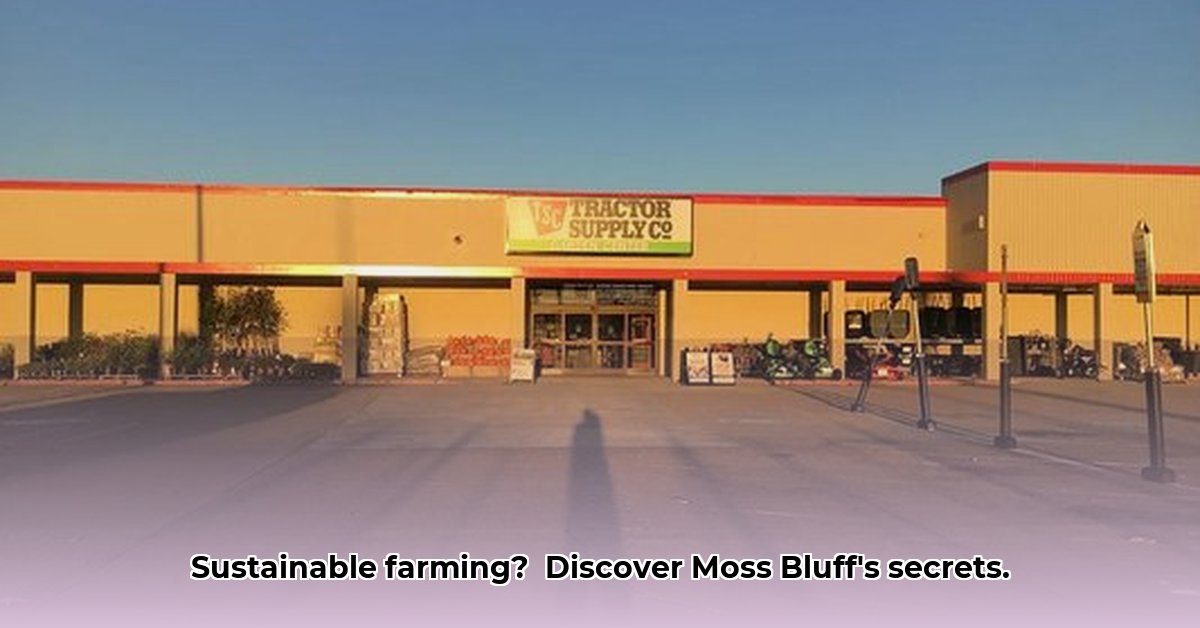
Moss Bluff Tractor Supply is a cornerstone of the Lake Charles agricultural community, providing farmers and ranchers with essential supplies. However, the increasing focus on sustainable agriculture raises questions about its role in supporting environmentally responsible practices. This article examines Moss Bluff Tractor Supply's contribution to sustainable farming, analyzing its product offerings, highlighting opportunities and challenges, and proposing actionable steps for creating a greener future for the region. For more information on efficient spreading equipment, check out this helpful resource.
Tractor Supply's Product Offerings: A Closer Look
Moss Bluff Tractor Supply offers a broad range of products, encompassing tools, equipment, seeds, and animal feed. Crucially, their inventory includes items directly relevant to sustainable agriculture. This includes organic fertilizers designed to improve soil health without harsh chemicals, and water-efficient irrigation systems aimed at conserving precious resources. However, the store also stocks conventional pesticides and fertilizers, which can potentially undermine efforts towards sustainable farming. This juxtaposition presents a significant choice point for farmers. How to reconcile the need for affordable solutions with long-term environmental responsibility?
Opportunities for Sustainable Farming
The availability of organic fertilizers at Moss Bluff Tractor Supply presents a significant opportunity for local farmers to reduce reliance on synthetic chemicals. These fertilizers promote healthier soil, leading to stronger crop yields and a reduced environmental impact. The presence of water-smart irrigation systems offers another critical avenue for sustainable water management, particularly important in drought-prone regions. Such investments translate into cost savings and enhanced farm productivity, making sustainable farming economically feasible.
Challenges and Limitations: Addressing the Gaps
While the presence of sustainable products is a positive step, significant challenges remain. The continued availability of conventional pesticides and fertilizers presents a clear obstacle to widespread sustainability adoption. Furthermore, a critical lack of transparency regarding the sourcing and sustainability certifications of many products hinders informed purchasing decisions by farmers. Without clear labeling and information on the environmental impact of their inputs, farmers lack the knowledge necessary to make truly responsible choices. Does this lack of transparency unintentionally sabotage sustainable farming efforts?
Consumer Choice and Responsibility: Driving Change
Ultimately, consumer choices are a powerful force driving the adoption of sustainable practices. When farmers consistently choose sustainably sourced products at Moss Bluff Tractor Supply, they signal a demand for more eco-friendly options. This increased demand creates a powerful incentive for the store to expand its selection of organic and environmentally responsible products, potentially reducing its reliance on less sustainable alternatives. Each purchasing decision is a vote for the kind of agricultural future desired for the Lake Charles region.
Recommendations for Stakeholders: A Collaborative Approach
A truly sustainable agricultural future in Lake Charles demands a combined effort from all stakeholders. This includes Moss Bluff Tractor Supply, local farmers, the local government, and environmental groups.
1. For Moss Bluff Tractor Supply: Increase transparency regarding product sourcing and sustainability certifications. Significantly expand the selection of organic and environmentally friendly products. Invest in staff training on sustainable agriculture best practices.
2. For Local Farmers: Prioritize the purchase of organic and sustainably sourced products. Advocate for the increased availability of sustainable options at Tractor Supply. Adopt sustainable farming practices informed by best-practice research and workshops.
3. For the Local Government: Provide financial incentives or tax breaks for farmers adopting sustainable agricultural practices. Invest in educational resources and workshops promoting sustainable agriculture techniques. Support collaborations between farmers, businesses, and environmental groups.
4. For Environmental Groups: Work closely with local stakeholders to identify needs, offer advice, and promote responsible practices. Engage in educational outreach to increase consumer awareness of the benefits of sustainable agriculture.
Conclusion: Building a Sustainable Future Together
Moss Bluff Tractor Supply occupies a pivotal role in the Lake Charles agricultural landscape. While the store offers some sustainable options, significant improvements are necessary to fully support a transition to environmentally responsible farming. A collaborative effort—encompassing transparent business practices, informed consumer choices, and proactive government policies—is crucial for creating a sustainable agricultural future. The path ahead presents challenges, but the rewards of a healthier environment and a more resilient food system are undoubtedly worth the collective effort.